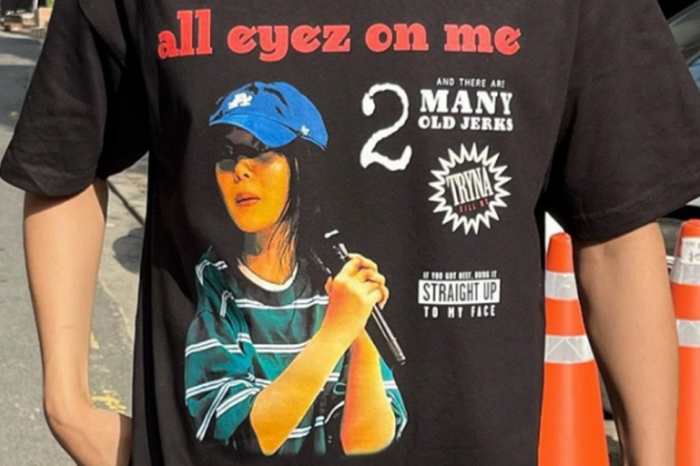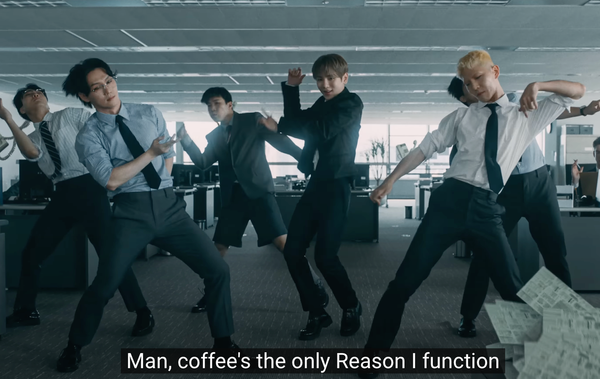Conversations about swastikas and K-pop give me migraines
A few weeks ago, in a very widely-covered story, TWICE’s Chaeyoung wore two very controversial shirts, one featuring a QAnon slogan, and one with Sid Vicious of the Sex Pistols wearing a Nazi Swastika.
I didn’t write about it at the time for a variety of reasons, partially in that I’ve pitched op-eds about these sort of instances before and no editor has thought they were worthwhile so I’ve felt like maybe my writing isn’t good enough to tackle sensitive subjects. But mostly, it was because it took me some time to reflect.
It’s always upsetting, being a Jewish person with liberal values, who doesn’t really want to see artists she covers wearing extremist symbols. But it wasn’t the clothing of Chaeyoung, however and why-ever they were donned, whether it was her choice or her stylist, which gave me a migraine that laid me up for two days. She apologized, let’s move on (because heavens only knows that’s what only happens, until you’re spewing full blown hate like Kanye). No, it was the conversations around it on stan twitter that caused me actual physical pain.
I know, I know. Don’t look at stan twitter about something you have your heart invested in. That was my first mistake. My second was assuming that just because Jewish fans were the ones leading the conversation, calling out the swastika featured on the tee as a Nazi symbol things would go well.
The story transformed throughout the following days, with it becoming apparent the Sid Vicious tee had been worn in several contexts, including Billboard’s Women in Music event, and at a NYC Jewish-owned restaurant. (How nobody at the Billboard event said anything is baffling to me, but that’s another conversation.)
Being a NYC Jew, you’d probably think I was offended, but to be honest I don’t have the energy or bandwidth to get offended every time someone does something that should be offensive to Jews by accident: there are actual extremists calling for death to Jews all day long, I can spend my energy on them.
It’s sort of side along to that where my migraine came in, as I watched fans try to explain away Chaeyoung’s mistaking the swastika that Vicious wore for a religious one, valued in many Asian cultures. No, we should know the Nazi swastika not by the term “swastika,” but the German word Hakenkreuz.
From a linguistic perspective, I thought this was a bit interesting, as the “swastika” as a shape in the English language pre-dates Naziism, and was in fact, drawing on its traditions as a symbol of luck, a popular image in the American northeast; my friend used to live in a pre-war building - and thus hard to renovate- in Manhattan covered in swastikas).
From a general perspective, if you only contemplate conversations about linguistic ownership of a racist term to defend your favorite celebrity… I think you may need to revisit your priorities.
From a Jewish perspective, I was pissed. I am not going to call something, as misappropriated as it is, by a German name solely for the sake of defending a K-pop star, disconnecting it from its actual sanskrit roots. I’m not going to call it by the German name, and let the Nazis take even more from something they’ve appropriated. By calling it what the Nazis did, they win a tiny bit.
This may seem dumb, and not level headed at all. I am aware, which is why I gave myself a migraine in stress over my irrational feelings. But I grew up in a family where we still — despite not being descendants of Holocaust survivors as my family, with the grace of Hashem, fled European persecution for North America in the late 1800s— didn’t support German brands. I grew up living next door to an Auschwitz survivor. Someone at our synagogue driving a BMW was unthinkable. When I wanted to go on a journalism initiative to Berlin in college that a professor had recommended me for, to learn precisely how German press was attempting to learn from its history, I was told by family members not to go (I regret it). We never watched German films, unless they were related to our people’s suffering. Other people spend their high school senior breaks at the beach; my senior year, I went with classmates to Auschwitz. Nowadays my relationship with present-day Germany and German culture is complicated, but the past’s remnants are still loud in my mind.
I’m not saying that these fans who were having this conversation were wrong, per say: English-language usage of the swastika does, by and large, disconnect it from its roots. In America, especially, it is so disconnected that when I once pointed out to a PR team that a member wearing his religious swastika paraphernalia during a US press cycle might be a problem, they declared it a failing of America to not educate beyond the Nazi appropriation. They weren’t wrong.
But all of this attempt at deciding what should be or shouldn’t be to help your K-pop star save face? It’s an excuse. All of the fan posturing and denial and attempting linguistic change over this whole situation is what frustrated and, let’s be honest, scared me. We’re talking about the wrong things, since what we think should be doesn’t matter when we are faced by reality full of violence and hate.
Other aspects of conversations surrounding Chaeyoung’s shirts were barely touched on, at least not in my timeline. Nobody was seemingly willing to raise the intensely worrisome issues, like are extremists going to turn her into an unwitting symbol of their hate, like Pepe the frog? Why does this keep happening in the industry, despite fan outrage and condemnation? And, on a broader scale re how we discuss certain historical atrocities and current mistreatment versus others; why do swastikas evoke this debate among K-pop fans and scrutiny from international media, but anti-blackness and other incidents of appropriation don’t?
A friend who is not a K-pop fan, but also Jewish, asked my why this keeps happening. I explained about cultural proximity to symbols, and how I’ve had some American friends, K-pop fans themselves, not understanding why Koreans are so offended by the Japanese rising sun imagery. This friend clarified their question: “No, why does it keep happening that fans get outraged, but nothing changes?” And that’s when I got an even bigger headache. Because this friend was 100% correct.
Immediately after the tee situation, TWICE sold out several shows in the US. I love TWICE, and had been concerned that ticketing might not go well amid the controversy, and I didn’t ever really make up my mind either way whether it was deserved (only one member had acted here, and had rapidly apologized, but should we not hold people accountable? These thoughts circled around my mind all day and night, and to be honest I myself am very much looking forward to attending their Metlife show.) Part of me is still really excited for them that they sold-out major venues, but the rest of me wondered… how much of this fan outrage was real, and how much of it was just to be mad about something? Why are people upset about this, K-pop aside, but not synagogues being targeted by white supremacists in attacks?
I partially assume it’s because defending Jews from Naziism on social media is real easy, when Hollywood has instructed us all to be. On top of that, less than .2% of the world’s population is Jewish, and most people active on the Internet do not and will never know a Jewish person intimately. This is something easy to be upset about on the anger-filled hell that is 2023’s Internet, because people really do mean it. But then, like everything else, they move on. No wonder it keeps on happening. To some degree, I wonder if it’s done intentionally by some PR-motivated stylists; this is intense, in most instance harmless in the long-term (as long as you’re a certain stature of K-pop star), and now people know your name in. Who cares if you’re now known as that “K-pop Nazi supporter” to some Jewish people? They are not your audience, and they do not, despite conspiracies that believe otherwise, control the world in way that could hinder most K-pop careers. Most other people will move on, as we’ve seen time and time again.
This is really long way to say “Tamar internalizes too much emotion while reading conversations on the Internet and probably needs more therapy than she can afford.” I am Jewish, after all!
Every element of this conversation is nuanced. I don’t know if I have the depth in a newsletter, I don’t even know if I’m making sense anymore. I don’t know if I’ll have the depth in 120 years of my life. All I know, is these conversations are both good and bad to have, and it felt important to write something. I hate reporting on K-pop stars, or anyone, doing or wearing something that causes hurt to others, and then nothing changes. I don’t think it’d be fair to penalize artists who wear these outfits, but I wish we were at a point when we don’t have to keep talking about it. But until then, I’ll keep giving myself migraines, and hope we all grow a little bit each time.
Some related reading:
“K-Celebs & Their Unintentionally Racist Clothes” by Jae-Ha Kim - Kim discussed a lot of the issues and recent instances of K-pop stars wearing hurtful imagery, whether it’s Nazi swastikas or Japanese rising suns. “It’s not a pop star’s job to be politically savvy,” she wrote. “However, it is the responsibility of their labels, management and publicists to do their due diligence to guide them.”
“It’s Not Modest Dressing. It’s the Torah-Teacher Aesthetic” by Mattie Kahn- I imagine most readers and people who know me in the K-pop world realize I grew up and still am Modern Orthodox, because I’m a particularly bad Orthodox Jewish woman and don’t dress the way many do. I’m still very frum at heart, despite the way I dress, though, so really related to this Vogue piece about how it feels to be seen in the current wave of modest garb that’s taking over runways, and also K-pop.
“When Things Get Anti-Semitic, I Turn to This Perfect Gif” by Gabrielle Hoyt - “When I receive news of cemeteries defiled, synagogues invaded, and families destroyed, words fail me. Captain von Trapp, however, never does. And much as I never want a reason to search for “captain von trapp + flag” again, the horrors of the past few years don’t leave me with much hope for that future.
So tear that swastika, my mid-century goysiche daddy. Tear it hard.”



